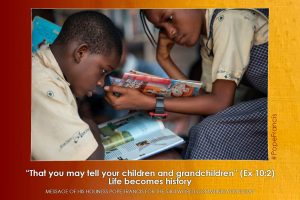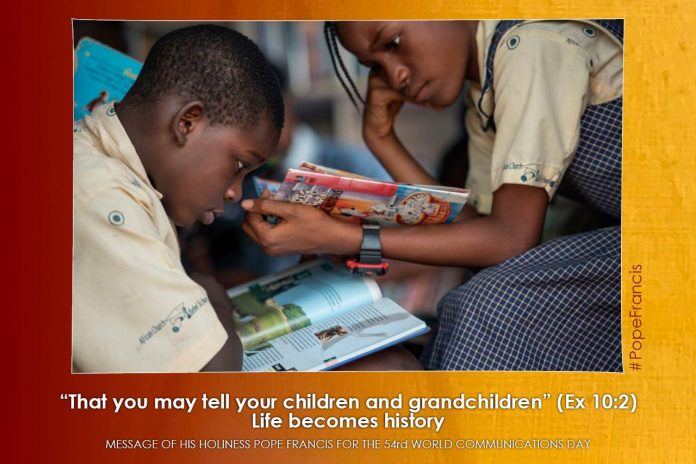Message of His Holiness Pope Francis for the 54th World Communications Day

I would like to devote this year’s Message to the theme of storytelling, because I believe that, so as not to lose our bearings, we need to make our own the truth contained in good stories. Stories that build up, not tear down; stories that help us rediscover our roots and the strength needed to move forward together. Amid the cacophony of voices and messages that surround us, we need a human story that can speak of ourselves and of the beauty all around us. A narrative that can regard our world and its happenings with a tender gaze. A narrative that can tell us that we are part of a living and interconnected tapestry. A narrative that can reveal the interweaving of the threads which connect us to one another.
Weaving stories
Human beings are storytellers. From childhood we hunger for stories just as we hunger for food. Stories influence our lives, whether in the form of fairy tales, novels, films, songs, news, even if we do not always realize it. Often we decide what is right or wrong based on characters and stories we have made our own. Stories leave their mark on us; they shape our convictions and our behaviour. They can help us understand and communicate who we are. Human beings are storytellers because we are engaged in a process of constant growth, discovering ourselves and becoming enriched in the tapestry of the days of our life. Yet since the very beginning, our story has been threatened: evil snakes its way through history.
The Story of stories
Sacred Scripture is a Story of stories. How many events, peoples and individuals it sets before us! It shows us from the very beginning a God who is both creator and narrator. Indeed, God speaks his word and things come into existence (cf. Gen 1). As narrator, God calls things into life, culminating in the creation of man and woman as his free dialogue partners, who make history alongside him. In one of the Psalms, the creature tells the creator: “For you formed my inward parts; you knitted me together in my mother’s womb. I praise you, for I am fearfully and wonderfully made … My frame was not hidden from you, when I was being made in secret, intricately woven in the depths of the earth” (139:13-15). We are not born complete, but need to be constantly “woven”, “knitted together”. Life is given to us as an invitation to continue to weave the “wonderful” mystery that we are.
The Bible is thus the great love story between God and humanity. At its centre stands Jesus, whose own story brings to fulfilment both God’s love for us and our love for God. Henceforth, in every generation, men and women are called to recount and commit to memory the most significant episodes of this Story of stories, those that best communicate its meaning. Jesus spoke of God not with abstract concepts, but with parables, brief stories taken from everyday life. At this point life becomes story and then, for the listener, story becomes life: the story becomes part of the life of those who listen to it,
and it changes them. The Gospels are also stories, and not by chance. While they tell us about Jesus, they are “performative”; they conform us to Jesus. The Gospel asks the reader to share in the same faith in order to share in the same life. The Gospel of John tells us that the quintessential storyteller – the Word – himself becomes the story: “God’s only Son, who is at the Father’s side, has made him known” (Jn 1: 18). The original verb, exegésato, can be translated both as “revealed” and “recounted”. God
has become personally woven into our humanity, and so has given us a new way of weaving our stories.
A story that renews us.
Telling God our story is never useless: even if the record of events remains the same, the meaning and perspective are always changing. To tell our story to the Lord is to enter into his gaze of compassionate love for us and for others. We can
recount to him the stories we live, bringing to him the people and the situations that fill our lives. With him we can reweave the fabric of life, darning its rips and tears. How much we, all of us, need to do exactly this! With the gaze of the great storyteller – the only one who has the ultimate point of view – we can then approach the other characters, our brothers and sisters, who are with us as actors in today’s story. For no one is an extra on the world stage, and everyone’s story is open to possible change. Even when we tell of evil, we can learn to leave room for redemption; in the midst of evil, we can also recognize the working of goodness and give it space.
So it is not a matter of simply telling stories as such, or of advertising ourselves, but rather of remembering who and what we are in God’s eyes, bearing witness to what the Spirit writes in our hearts and revealing to everyone that his or her story
contains marvellous things. In order to do this, let us entrust ourselves to a woman who knit together in her womb the humanity of God and, the Gospel tells us, wove together the events of her life. For the Virgin Mary “treasured all these
things and pondered them in her heart” (Lk 2: 19). Let us ask for help from her, who knew how to untie the knots of life with the gentle strength of love: O Mary, woman and mother, you wove the divine Word in your womb, you recounted by your life the magnificent works of God. Listen to our stories, hold them in your heart and make your own the stories that no one wants to hear. Teach us to recognize the good thread that runs through history. Look at the tangled knots in our life that paralyze our memory. By your gentle hands, every knot can be untied. Woman of the Spirit, mother of trust, inspire us too. Help us build stories of peace, stories that point to the future. And show us the way to live them together.
Rome, at Saint John Lateran, 24 January 2020, the Memorial of Saint Francis de Sales Franciscus

